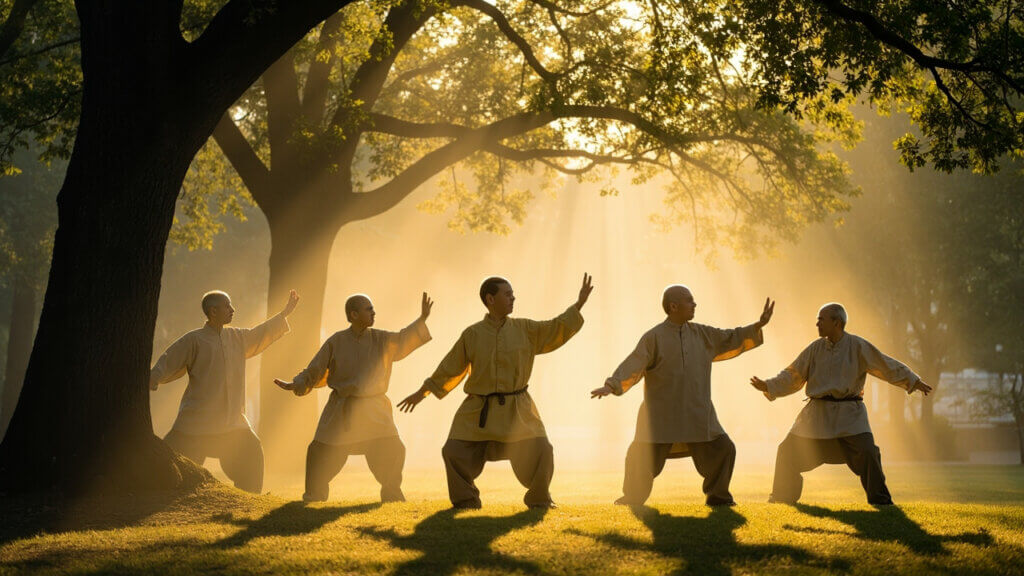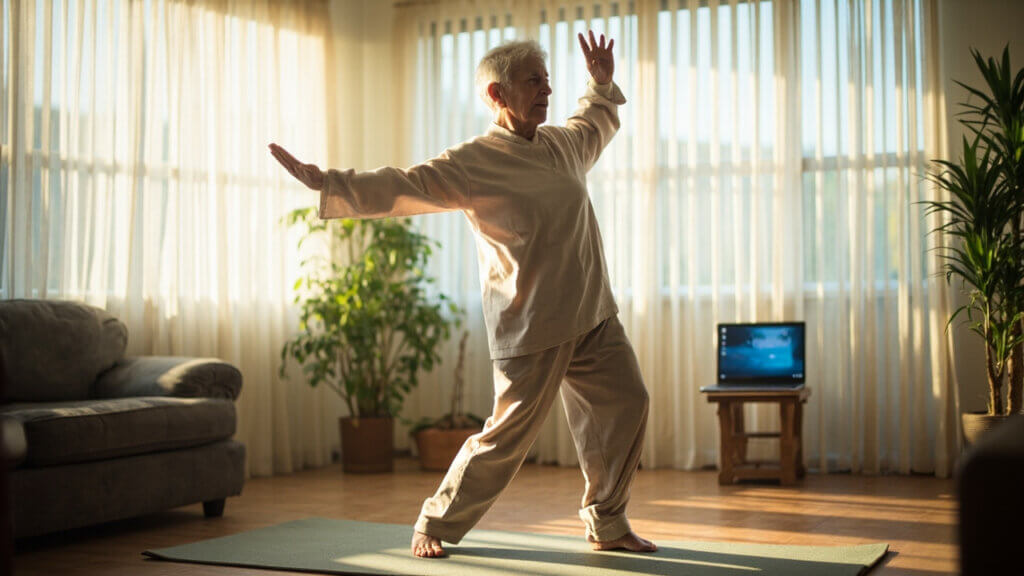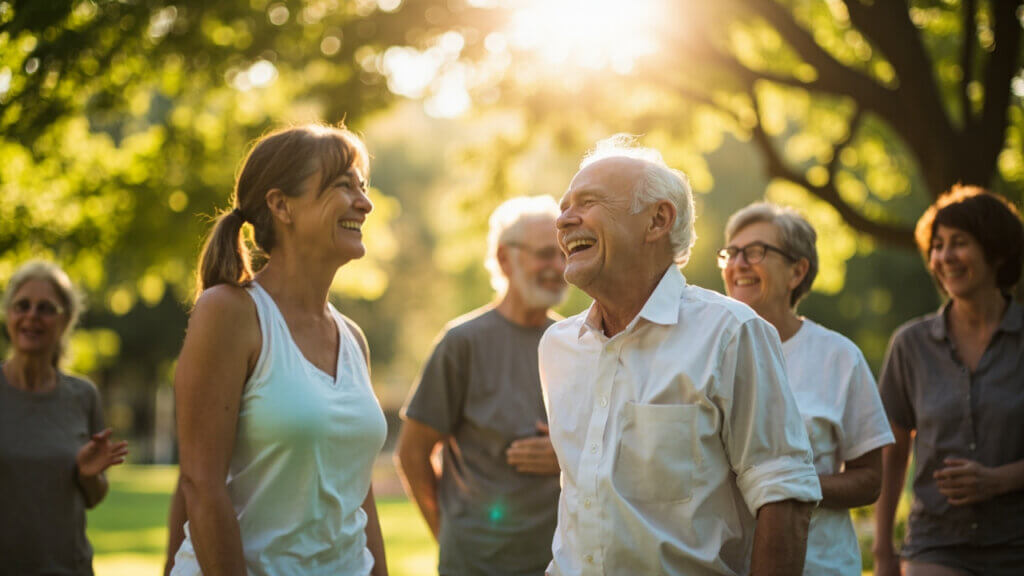If you’re over 50 and looking for a way to stay active without the joint pain or burnout of high-impact workouts, Tai Chi might be exactly what your body and mind need.
Known as “meditation in motion,” Tai Chi is a gentle, flowing form of exercise that improves balance, flexibility, and mental clarity—all while being incredibly easy on the body. In this guide, we’ll explore why more and more adults over 50 are turning to Tai Chi in 2025—and how you can get started safely, even from home.
What Is Tai Chi, Exactly?
Tai Chi (pronounced “tie-chee”) is an ancient Chinese martial art originally developed for self-defense. Today, it’s practiced worldwide as a low-impact mind-body exercise.
It involves:
- Slow, intentional movements
- Deep, natural breathing
- A focus on posture and balance
- Relaxed concentration—without mental strain
Think of it as yoga in motion, but without needing to bend or stretch in extreme positions.

Why Tai Chi Works So Well for People Over 50
As we age, our bodies—and minds—change. Tai Chi addresses some of the most common issues experienced after 50:
H2: 1. Improves Balance and Prevents Falls
Falls are a top cause of injury for older adults. Tai Chi strengthens the lower body, improves reflexes, and teaches body awareness, making falls less likely.
A 2023 CDC-supported study found that older adults who practiced Tai Chi reduced fall risk by up to 43%.
H2: 2. Reduces Joint Pain Without Stressing the Body
Unlike jogging or strength training, Tai Chi involves no jumping or jarring movements. It’s perfect for those with:
- Osteoarthritis
- Knee pain
- Back issues
- Stiff joints in the morning
H2: 3. Supports Mental Health and Reduces Stress
Tai Chi is calming. Just 20–30 minutes a day can lead to:
- Lower anxiety
- Better sleep
- Improved mood
- Reduced symptoms of depression
Bonus: It’s a mindful practice, often compared to moving meditation—without needing to sit still.
H2: 4. Boosts Cognitive Function
Emerging research shows that Tai Chi may slow age-related memory decline, improve focus, and even support brain health by increasing blood flow to the brain.
A 2024 NIH study noted improved cognitive scores in seniors who practiced Tai Chi 3x per week.
How to Start Practicing Tai Chi After 50
Getting started is easier than you might think.
H3: 1. Join a Local Class
Check with local community centers, YMCAs, or senior centers. Look for “Beginner” or “Gentle Tai Chi” sessions.
H3: 2. Try Free Online Videos
Platforms like YouTube offer excellent, easy-to-follow videos for all levels. Look for instructors like “Tai Chi Health with David-Dorian Ross” or “Dr. Paul Lam’s Tai Chi for Arthritis.”
Tip: Search “Tai Chi for Beginners Over 50” to find videos designed just for your pace.

H3: 3. Wear Comfortable Clothing
There’s no special uniform. Just loose-fitting clothes and non-slip shoes or bare feet on a clean surface.
H3: 4. Start with 10 Minutes a Day
Even a short daily practice can build strength, balance, and clarity over time. Listen to your body and move at your own rhythm.
Common Myths About Tai Chi (Debunked)
“Isn’t it just waving your hands slowly?”
Not at all. Tai Chi involves full-body coordination, weight shifting, and deep awareness of movement.
“I’m not flexible—can I still do it?”
Yes! Tai Chi is designed to work with your body, not against it. Movements are gentle and adjustable for all levels.
“Isn’t it too slow to count as real exercise?”
It may be slow, but it’s powerful. Studies show Tai Chi improves muscle strength, heart health, and energy—even if it doesn’t feel like a “workout.”
Real Benefits: What Seniors Say About Tai Chi
- “It helped my knees more than physical therapy.”
- “After just a few weeks, I noticed fewer stumbles and more confidence walking outside.”
- “I finally found an exercise that relaxes my mind while helping my body.”
- “I sleep better and feel calmer.”

FAQs: Tai Chi Over 50
Do I need to be in good shape to start?
No. Tai Chi is accessible at nearly every fitness level. You can even start with seated Tai Chi if standing is difficult.
How long before I feel the benefits?
Many people report feeling more relaxed after just one session. Physical improvements like balance and flexibility often come within 4–6 weeks of regular practice.
Is Tai Chi safe if I have arthritis or osteoporosis?
Yes. In fact, it’s one of the most recommended exercises for these conditions. Still, check with your doctor before starting any new physical routine.
Final Thoughts: Small Movements, Big Impact
Tai Chi isn’t about sweating or counting reps. It’s about tuning into your body, finding your balance—physically and mentally—and building strength and peace over time.
So if you’re looking for an exercise that meets you where you are in life, Tai Chi might be your perfect next step.
Start small, breathe deeply, and move gently—your body will thank you.
